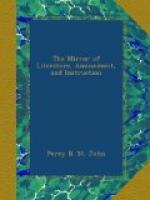“The principal part of the venerable ruins are included in the pleasure gardens of Henry Lee Warner, Esq., who has a large, commodious house, which occupies the site of the priory. The present proprietor has progressively, for some years past, been making various improvements in planting and laying out the grounds in the immediate vicinity of the mansion. Among the recent embellishments of the place is a new bridge across the rivulet, in front of the house, and widening the course of the stream, so as to give it the appearance of a lake. Contiguous to this water, and intermixed in a fine grove of large trees, are the various fragments of the ruins already noticed. Some of these are interesting relics of architectural antiquity; and though several detached parts remain, yet we cannot (says Britton) but regret the wasteful destruction that has taken place at this once celebrated place of monastic splendour and human superstition.”—Beauties of England and Wales, vol. ix.—Norfolk.
It has been supposed that Henry the Eighth, tempted by the riches and splendour of the religious houses at Walsingham, precipitated their fall.
P.T.W.
* * * * *
TAPESTRY IN WINDSOR CASTLE.
(To the Editor.)
There are six pieces of tapestry in the Ball-room adjoining St. George’s Hall, Windsor Castle; and the subject is Jason and the Golden Fleece. In your account you stated four.
A SUBSCRIBER.
* * * * *
COWSLIPS.—A SONNET.
BY HENRY BRANDRETH, JUN.
Author of Minstrel Melodies, The Garland, &c.
COWSLIPS—sweet Cowslips!
I scarce know a flower
More prized than is the cowslip.
Childhood’s hand
Plucks it as if by instinct. Every
land
Has some peculiar flowret—this
the bower,
The mountain that adorning. April’s
shower
The modest primrose sifts with beauty
bland,
Or o’er the blue-bell waves her
fairy wand,
The delegate of Flora’s magic power.
But most love I the cowslip, with its
fair
And fragrant petals, studding, as with
gold,
The emerald meadow, or the hedge-row green;
For, while the laugh of Infancy is there,
The heart must be as very marble cold
Of him who frowns on such a joyous scene.
* * * * *
The Naturalist,
* * * * *
THE WHITE-HEADED, OR BALD EAGLE.[2]
(From Wilson’s American Ornithology, judiciously re-printed in two volumes of Constable’s Miscellany.)




